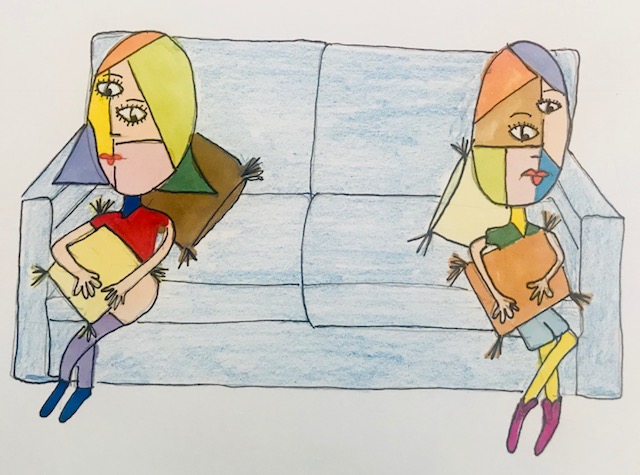Too often I see couples sitting on opposite ends of my couch, clutching onto the decorative pillows as if they were floatation devices, staring angrily in opposite directions. Yet, when they talk to me about what they most deeply desire, it is EXACTLY THE SAME THING as their partner describes – to be seen, heard, understood and LOVED.
Why then, when they BOTH crave such deep intimacy and affection is it so incredibly difficult to step across the great divide and GET WHAT THEY WANT? Much of this has to do with the unhealthy dynamic that builds up over the years, a massive encrustation of marriage, children, fatigue, chores unmet needs, lost dreams, depression, anxiety, resentment, anger and blame all projected onto their partner – like a colossal fractured mirror being held up on a daily basis, silently screaming to their long lost fantasy mate: YOU did this to me! I would have had a better life if it weren’t for YOU. YOU presented as something completely different then you actually are. It’s all YOUR fault that I feel like this. If YOU would only change, everything would be different.
The dynamic of many relationships is not built on true authenticity but on strong defense mechanisms that act as barriers not bridges. Defense mechanisms are important because they are in place to protect our most vulnerable feelings, however many relationships get stuck operating out of defenses not vulnerability.
Without risking over simplification of a complex dynamic unique to each person and couple, change can only happen if BOTH partners are able to understand that each of them came into the relationship BROKEN. If we try to put two broken pieces together, nothing fits, everything falls apart. And that’s the point. Life is messy, fragmented and disappointing and so are relationships. Understanding and accepting this disappointment is simply part of the process of being in a partnership, confronting the mundane, the monotonous, the painful and of course the miraculous glimpses of beauty and joy.
This shared awareness of disappointment will bring two broken pieces closer together, allowing them to recognize that wholeness is the result of an awareness of one’s brokenness. Thus, instead of trying to see your partner as a reflection of your ideal companion, you will begin to see him or her as a reflection of your own wounds. For it is you that chose and created the story the you are living. Your partner is simply a character in that story that is playing out their part. Turn toward the brokenness in your story. And if both partners are open to seeing it, they will begin to get their needs met – to be heard, seen, loved and understood, without sabotaging or hurting each other in the process.



NO COMMENTS